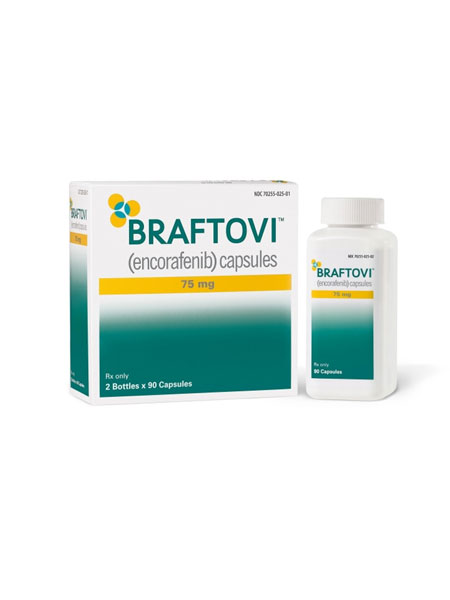Keytruda (pembrolizumab) vs Braftovi (encorafenib)
Keytruda (pembrolizumab) vs Braftovi (encorafenib)
Keytruda (pembrolizumab) is an immunotherapy drug that works by blocking the PD-1 pathway, which cancer cells use to hide from the immune system, and is commonly used in various types of cancers, including melanoma, lung cancer, and head and neck cancers. Braftovi (encorafenib) is a targeted therapy that specifically inhibits the BRAF V600E mutation, which is present in some melanoma patients, as well as in patients with other types of cancer. The choice between Keytruda and Braftovi would depend on the patient's specific type of cancer, the presence of certain genetic mutations, and the overall treatment plan determined by the healthcare provider.
Difference between Keytruda and Braftovi
| Metric | Keytruda (pembrolizumab) | Braftovi (encorafenib) |
|---|---|---|
| Generic name | Pembrolizumab | Encorafenib |
| Indications | Various cancers including melanoma, lung cancer, head and neck cancer, Hodgkin lymphoma, and others | Advanced melanoma with a BRAF V600E or V600K mutation, as detected by an FDA-approved test, in combination with a MEK inhibitor |
| Mechanism of action | Programmed death receptor-1 (PD-1) blocking antibody | BRAF kinase inhibitor |
| Brand names | Keytruda | Braftovi |
| Administrative route | Intravenous infusion | Oral |
| Side effects | Fatigue, musculoskeletal pain, decreased appetite, itching, diarrhea, nausea, rash, fever, cough, dyspnea, constipation, pain, and abdominal pain | Fatigue, nausea, diarrhea, vomiting, abdominal pain, and arthralgia |
| Contraindications | None known | None known |
| Drug class | Anti-PD-1 monoclonal antibody | BRAF inhibitor |
| Manufacturer | Merck & Co. | Pfizer Inc. (in collaboration with Array BioPharma Inc.) |
Efficacy
Keytruda (Pembrolizumab) Efficacy in Colorectal Cancer
Keytruda, known generically as pembrolizumab, is an immunotherapy drug that has shown efficacy in treating certain types of colorectal cancer. Specifically, it is indicated for the treatment of patients with metastatic colorectal cancer that has high microsatellite instability (MSI-H) or mismatch repair deficiency (dMMR). These biomarkers are indicative of a greater likelihood of response to immunotherapy. Clinical trials have demonstrated that pembrolizumab can lead to significant tumor shrinkage and prolonged progression-free survival in patients with MSI-H or dMMR colorectal cancer. The response rate and duration of response vary among patients, but some have experienced long-term remissions with this treatment.
Braftovi (Encorafenib) Efficacy in Colorectal Cancer
Braftovi, or encorafenib, is a targeted therapy that inhibits the BRAF V600E mutation, which can be present in a subset of colorectal cancers. When used in combination with other agents such as cetuximab, encorafenib has been shown to improve outcomes in patients with metastatic colorectal cancer harboring the BRAF V600E mutation. The combination treatment has led to improved overall survival and progression-free survival compared to standard therapies. It is important to note that the efficacy of encorafenib is specifically linked to the presence of the BRAF V600E mutation, and its use is contingent upon the confirmation of this mutation in tumor specimens.
Combination Therapy with Keytruda and Braftovi
While Keytruda and Braftovi are effective as monotherapies for specific patient populations with colorectal cancer, research is ongoing to evaluate the potential benefits of combining immunotherapy with targeted therapy. Early clinical trials are exploring the efficacy of pembrolizumab in combination with encorafenib and other agents in patients with advanced colorectal cancer. These studies aim to determine whether such combinations can provide synergistic effects that enhance tumor response and improve patient outcomes. However, more data is needed to establish the efficacy and safety of these combination therapies in the colorectal cancer setting.
Conclusion
Both Keytruda and Braftovi have brought significant advancements in the treatment of colorectal cancer, offering hope to patients with specific genetic profiles. Keytruda has become a cornerstone treatment for MSI-H or dMMR metastatic colorectal cancer, while Braftovi targets the BRAF V600E mutation with notable efficacy. As the understanding of colorectal cancer biology expands, these medicines continue to be studied both as monotherapies and in combination with other treatments. It is critical for healthcare providers to consider the unique genetic makeup of each patient's cancer to optimize treatment strategies and to stay informed about the latest clinical evidence supporting the use of these innovative therapies.
Regulatory Agency Approvals
Keytruda
-
European Medical Agency (EMA), European Union

-
Food and Drug Administration (FDA), USA

-
Health Canada

-
Therapeutic Goods Administration (TGA), Australia

-
Medsafe (NZ)

Braftovi
-
European Medical Agency (EMA), European Union

-
Food and Drug Administration (FDA), USA

-
Pharmaceuticals and Medical Devices Agency (PMDA), Japan

Access Keytruda or Braftovi today
If Keytruda or Braftovi are not approved or available in your country (e.g. due to supply issues), you can access them via Everyone.org.
How it works

Make an enquiry
Choose the medicine you want to buy, answer a couple of questions, and upload your prescription to speed things up. We’ll get back to you within 24 hours.


Make an enquiry
Choose the medicine you want to buy, answer a couple of questions, and upload your prescription to speed things up. We’ll get back to you within 24 hours.


Breeze through the paperwork
We'll guide you through the required documents for importing unapproved medicine, ensuring you have all the necessary information.


Get a personalized quote
We’ll prepare a quote for you, including medicine costs and any shipping, administrative, or import fees that may apply.


Receive your medicine
Accept the quote and we’ll handle the rest - sourcing and safely delivering your medicine.

Some text on this page has been automatically generated. Speak to your physician before you start a new treatment or medication.
Let's talk
If you have any questions, call us or send us a message through WhatsApp or email:
Contact us




